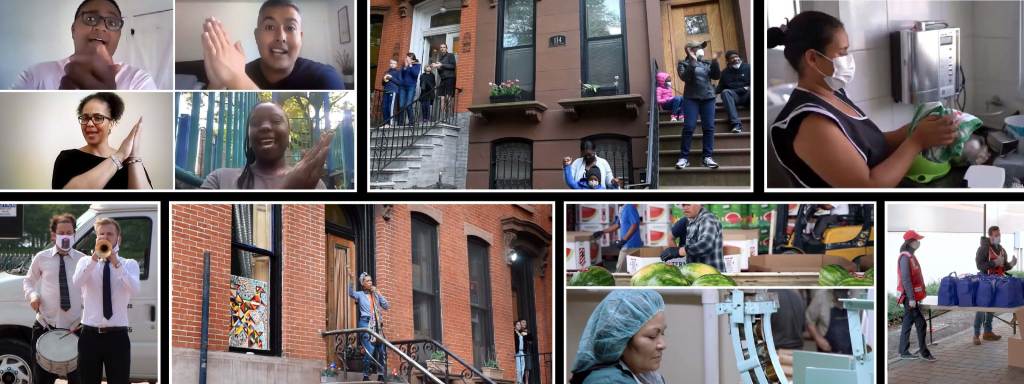
Workers and Activists Join Forces to Reimagine the Economy
At the start of the pandemic, people across the United States clapped for frontline workers, an important public ritual that helped bring us together during uncertain times.
In the months since, the economic and health impacts of COVID-19 have been catastrophic. More than 180,000 people have died due to the virus. Tens of millions have lost their jobs while workers in low-wage sectors have been forced to choose between their lives and their livelihoods, risking sickness to avoid deepening poverty. Working people have kept this country alive through enormous personal sacrifice and heavy cost, all without the voice, benefits, or protections a country built on equality should guarantee.
COVID-19 did not create these economic shocks. While the pandemic has exposed the ugly truths about America’s labor system, working people have been experiencing a moment of crisis for much longer. For decades, essential workers, who are disproportionately Black, people of color, immigrants, women, and other marginalized communities, have powered an economy that enriched the rich and impoverished the poor. As America’s economic output tripled and CEO salaries skyrocketed, workers were left behind and their economic power diminished.
Accessibility Statement
- All videos produced by the Ford Foundation since 2020 include captions and downloadable transcripts. For videos where visuals require additional understanding, we offer audio-described versions.
- We are continuing to make videos produced prior to 2020 accessible.
- Videos from third-party sources (those not produced by the Ford Foundation) may not have captions, accessible transcripts, or audio descriptions.
- To improve accessibility beyond our site, we’ve created a free video accessibility WordPress plug-in.
Yet, America prides itself on being a society of economic opportunity where, through hard work and ambition, working people are expected to pull themselves up by their bootstraps if they want to succeed. Our present moment is a reminder, however, of Dr. Martin Luther King Jr.’s timeless observation that “it is a cruel jest to say to a bootless man that he ought to lift himself by his own bootstraps.”
The reality is that America’s economic system is built on entrenched inequalities that existed well before COVID-19’s arrival. The 53 million people who work in low-wage sectors earn less than $18,000 a year. Black women earn 61 cents to every dollar white men make. Gig workers, who make up 33 percent of the economy, are denied basic benefits like sick leave and health care. Thirty percent of domestic workers, who make so much work in America possible, rely on public assistance for food security. And one in four working Americans—approximately 36 million people—lack paid sick leave, while undocumented workers are denied access to any benefits at all. This is during “normal” times.
What COVID-19 has made clear is that America cannot return to “normal.” Courageous worker rights organizations are leading the charge to ensure that, after the virus, the country reimagines—and rebuilds—the economy to work for everyone and essential workers are guaranteed the essentials they deserve. We are proud to support a number of these organizations amplifying the power of the workers—from grocery store clerks and delivery drivers to farm and factory workers—who have kept the US running during this pandemic.
By clapping back with a vision for a just economy, these activists are creating a chorus with workers demanding to be heard and demanding that the future of work is now—because it has to be.
Ensuring a decent standard of living
- Jobs with Justice (JWJ) is a national network of grassroots organizations addressing the many challenges working people face through expanding collective bargaining and worker voice. JWJ’s coalitions in the District of Columbia and California ensured undocumented workers and others left out of the national stimulus package received millions of dollars in COVID-19 relief. Beyond those efforts, JWJ’s Chicago coalition recently helped the city’s teacher union and community groups win victories, such as wage increases, improved working conditions, and increased support for students.
- National Employment Law Project (NELP) is a policy and advocacy organization focused on raising standards for working people such as increasing the minimum wage, combating wage theft, and expanding unemployment benefits. During the pandemic, NELP has testified before Congress to advocate for unemployment insurance expansions. In addition, NELP secured a $15 minimum wage in states such as Connecticut, Illinois, Maryland, and New Jersey and overtime pay in six states.
- One Fair Wage (OFW) is a national campaign, coalition, and organization that works to ensure a full and fair minimum wage for all, including young, tipped, disabled, incarcerated, and gig workers. OFW has helped restaurants provide livable wages to their employees and meals to workers in low-wage and frontline jobs through its High Road Kitchens program. OFW has also fought to include fair wage at the ballot box in places like Arizona, DC and Maine.
Raising standards to secure worker benefits and protections
- Caring Across Generations (CAG) is a cross-sectoral campaign of caregivers, workers, people with disabilities and older Americans seeking to create a nation where everyone can live, work, and age with dignity. To address the pandemic’s immediate needs and work toward an equitable recovery, CAG joined the National Domestic Workers Alliance and 60 other partners to put together a proposal to transform the undervalued and chronically underfunded care system. CAG also advocates for bold ideas such as Universal Family Care, which made The Nation’s Honor Roll as the 2019 Next Big Idea.
- National Domestic Workers Alliance (NDWA) is a coalition of organizations and domestic workers seeking to raise standards and ensure dignity on the job. As COVID-19 began to spread across the US, it set up a relief fund for domestic workers and continues to serve as a key architect of such initiatives as the Essential Workers Campaign and the Domestic Workers Bill of Rights, which it has helped pass in several states.
- Family Values @ Work is a network of state and city coalitions focused on securing universal paid sick days and family and medical leave for all workers. In New York, its coalition worked with Citizen Action of New York to secure paid sick days for workers in quarantine. Over the last two decades, Family Values has won paid sick days in 52 cities and states, paid Family and Medical Leave in eight states and DC, positively impacting over 50 million people.
- Paid Leave for All is a collaborative of organizations advocating for comprehensive, inclusive federal paid family and medical leave. Its members worked to secure the first federal paid leave and sick days provisions in the Families First Coronavirus Response Act, which provides up to 10 paid sick days and 10 weeks of paid family and medical leave. This was the first time Congress has required federal paid leave for private sector workers. Its members also helped to pass the 1993 Family Medical Leave Act, which provided unpaid leave to working people.
Uplifting voices and building worker power
- Justice for Migrant Women is a grassroots organization seeking to advance the rights of migrant women, particularly farmworkers. Seeing how COVID-19 affected these communities, it set up an emergency farmworker fund, started an initiative to get personal protective equipment to farmworkers, and developed a set of policy priorities for navigating the crisis.
- United for Respect (UfR) is a movement of working people who seek to collectively build an economy where they experience dignity in work and life. To support essential workers, the movement is leading a range of strategies to help them secure safety protections, access hazard pay, and advocate on the job.
- CoWorker.org is an organization that helps workers strategize, organize, and build their collective power. Through its digital organizing platform, it has helped frontline workers impacted by COVID-19 launch hundreds of campaigns. One of its recent wins before the pandemic was convincing Starbucks to expand parental leave to fathers, LGBT parents, and adoptive parents.
- Honor Essential Workers is a campaign, launching on Labor Day, to secure collective bargaining and other standards outlined in the Essential Workers Bill of Rights. The campaign was developed by unions and workers rights organizations and unions committed to lifting up the voices, rights, and powers of workers.
Advancing innovation and new thinking
- Clean Slate Project, a project of Harvard Law School’s Labor and Worklife Program, collaborates with labor, business, social, policy and academic leaders to reimagine labor law from a clean slate to empower working people to build an equitable economy. In partnership with Roosevelt Institute, it proposed structural reforms that will empower workers to shape the nation’s pandemic response.
- The Workers Lab is an innovation lab that has seeded dozens of breakthroughs in technology, organizing, and more to unlock new ways to build power for working people. It set up a COVID-19 rapid response fund to support workers without a safety net.
- Driver’s Seat is the first driver-owned data co-op that connects rideshare drivers and delivery drivers to maximize their pay, understand their expenses, and aggregate their data to earn a profit. Its technology has helped city governments better understand how much rideshare drivers earn—and learn when they aren’t being paid the legal minimum wage.
